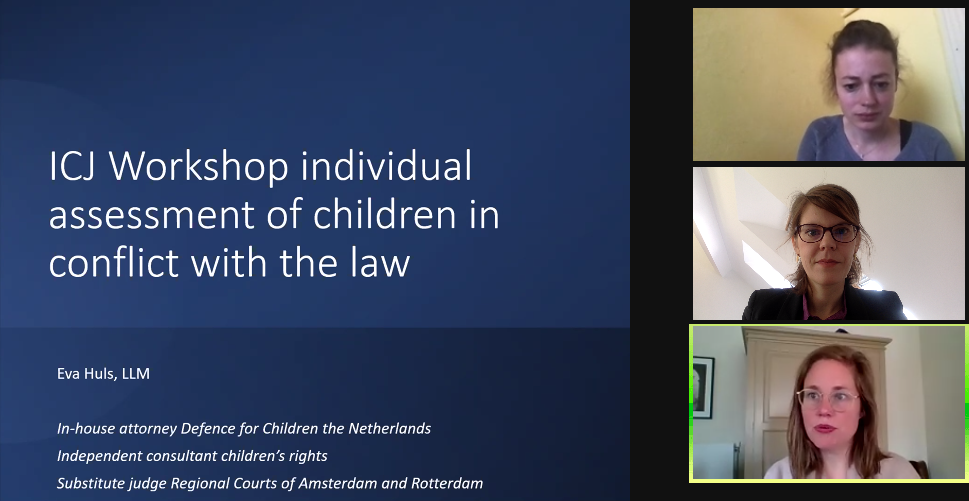
May 5, 2021 | News
The ICJ condemns the Danish authorities’ practice of revoking residence permits of Syrian refugees, mainly women and older men, on the false premise that Syria is safe for refugees’ return. Partly due to a lack of diplomatic relations with Syria, Denmark cannot forcibly remove refugees and instead detains them.
These practices should end immediately, individual assessments must be carried out in each case, and those detained pending removal should be immediately released, the ICJ said.
“International law requires that before any forcible removal, an individualized assessment of risks for each individual must be made and the principle of non-refoulement must be respected at all times,” said Róisín Pillay, ICJ Europe and Central Asia Director.
The principle of non-refoulement, prohibiting States to transfer anyone to a country where he or she faces a real risk of persecution or other serious human rights abuses, is a fundamental principle of international law and one of the strongest limitations on the right of States to control entry into their territory and to expel aliens as an expression of their sovereignty, as set out in Article 33 of the Geneva Refugee Convention and Article 3 of the Convention against Torture.
“Immigration detention pending removal is permitted only for as long as removal proceedings are in progress, and only if such proceedings are executed with due diligence and there is a realistic prospect that removal will be carried out within a reasonable time. Denmark’s practices fail to meet these standards as set out in international and EU law,” Pillay added.
At least 189 Syrians have had applications for renewal of temporary residency status denied since last summer, a move the Danish authorities said was justified because of a report that found the security situation in some parts of Syria had “improved significantly”. In March, ECRE and the Danish Refugee Council reported that the geographical scope of reassessments of cases of Syrian nationals has been expanded to include cases from greater Damascus with hundreds of cases set to be reassessed by the Appeals Board in 2021.
“The ‘improved situation’ assessment in Syria does not reflect the reality on the ground and runs counter to assessments of the UN, the European Parliament and other countries,” said Róisín Pillay.
On 11 March, the European Parliament adopted a resolution on the conflict in Syria which “(r)eminds all Member States that Syria is not a safe country to return” for refugees, and “calls on all EU Member States to refrain from shifting national policies towards depriving certain categories of Syrians of their protected status, and to reverse this trend if they have already applied such policies.” The EP also opposed any “normalization of diplomatic relations with the Syrian regime as long as there is no fundamental progress on the ground in Syria, with clear, sustained and credible engagement in an inclusive political process.”
The UNHCR considers that “changes in the objective circumstances in Syria, including relative security improvements in parts of the territory, are not of a fundamental, stable and durable character so as to warrant cessation of refugee status on the basis of Article 1C(5) of the 1951 Convention.” Furthermore, “in light of continued conflict, insecurity, and contamination with explosive remnants of war (ERW); severe concerns about the rule of law and widespread human rights violations and abuses, including against returnees; fragmented community relations and a lack of genuine reconciliation efforts; massive destruction and damage to homes, critical infrastructure and agricultural lands; and deepening economic and humanitarian crises, which are compounded by the COVID-19 pandemic, UNHCR continues to call on states not to forcibly return Syrian nationals and former habitual residents of Syria, including Palestinians previously residing in Syria, to any part of Syria, regardless of whether the area is under control of the Government or under control of another state or non-state entity. ”
“The Danish authorities’ assessment of the situation in Syria refers solely to the situation of wide-spread violence and bombing in some parts of Syria, in total disregard of the continuing hostilities in other parts of the country, as well as Syria’s abysmal human rights record, including widespread and systematic use of torture and other ill-treatment, arbitrary detention and enforced disappearances,” said Said Benarbia, ICJ MENA Director.
Read the full statement here.

May 4, 2021 | Новости, Пресс-релизы
Сегодня Международная комиссия юристов (МКЮ) осудила задержание, допрос и обыски в помещениях адвоката Ивана Павлова, известного адвоката и главы правозащитного объединения «Команда 29».
Павлов был задержан сотрудниками Федеральной службы безопасности (ФСБ) 30 апреля, после обыска в номере московской гостиницы, где он остановился. Он был освобожден позднее в этот же день. Согласно постановлению о возбуждении уголовного дела, Павлову предъявлено обвинение в «разглашении данных предварительного расследования» по статье 310 УК РФ. Согласно постановлению о привлечении в качестве обвиняемого, он обвиняется в передаче газете «Ведомости» копии о привлечении в качестве обвиняемого по делу своего подзащитного, журналиста Ивана Сафронова. Кроме того, Павлову инкриминируют разглашение псевдонима одного из свидетелей по делу.
Согласно постановлению Басманного суда об избрании меры пресечения, Павлову запрещено общаться со свидетелями по уголовному делу, за исключением близких родственников, пользоваться Интернетом и другими средствами связи.
«Российские власти должны прекратить преследование Ивана Павлова и «Команды 29», которое почти наверняка связано с тем, что они представляют доверителей по ряду громких дел», – отметила Роушин Пиллэй, директор Программы МКЮ по Европе и Центральной Азии.
«Подобные рейды явно нарушают адвокатскую тайну. Материалы дела, изъятые в ходе обыска, должны быть возвращены адвокатам, и Павлов должен иметь возможность продолжать свою работу по защите всех доверителей, не опасаясь преследований или возмездия, как этого требуют международные стандарты», – добавила она.
В соответствии с Основными принципами ООН, касающимися роли юристов, правительства должны обеспечить, чтобы юристы «… могли выполнять все свои профессиональные обязанности в обстановке, свободной от угроз, препятствий, запугивания или неоправданного вмешательства; […] и (c) не подвергались судебному преследованию и судебным, административным, экономическим или другим санкциям за любые действия, совершенные в соответствии с признанными профессиональными обязанностями, нормами и этикой» (Принцип 16). Кроме того, юристы «не отождествляются со своими клиентами или интересами своих клиентов в результате выполнения ими своих функций» (Принцип 18).
Иван Павлов представляет клиентов по ряду громких дел, в том числе по многим делам, расследуемым ФСБ. Среди его доверителей – Фонд борьбы с коррупцией лидера российской оппозиции Алексея Навального, дело топ-менеджера российской электроэнергетической компании («Интер РАО») Карины Цуркан, физика Виктора Кудрявцева, журналиста Ивана Сафронова и журналиста Григория Пасько.
Помимо обыска в гостиничном номере Павлова, власти провели обыск в офисе «Команды 29» в Санкт-Петербурге и в квартире супруги адвоката. В результате обысков почти все материалы по делу подзащитного Павлова Ивана Сафронова были изъяты сотрудниками правоохранительных органов. Эти обыски не могут быть оправданы утверждениями о разглашении данных расследования и вызывают обеспокоенность в связи с тем, что основания для уголовного преследования адвоката могут быть незаконными.
«Хотя защита тайны предварительного следствия может быть законной процедурой, она не является оправданием для вмешательства в работу адвокатов, в том числе путем получения доступа к их помещениям и адвокатским досье, и ни при каких обстоятельствах не должна использоваться против адвокатов как средство их запугивания или возмездия, – подчеркнула Роушин Пиллэй. – МКЮ призывает российские следственные органы прекратить любые следственные действия, которые могут нарушить права адвоката, и соблюдать адвокатскую тайну в случаях, когда адвокат представляет интересы доверителей, независимо от того, насколько чувствительными для властей могут быть такие дела».
В соответствии с международным правом и российским законодательством, общение адвокатов с доверителями в рамках профессиональных отношений и соответствующая документация защищены законом от изъятия и разглашения в соответствии с принципом конфиденциальности отношений между адвокатом и доверителем. В частности, права на справедливое судебное разбирательство, семейную и частную жизнь гарантируются Европейской конвенцией о правах человека (статьи 6 и 8 соответственно) и Международным пактом о гражданских и политических правах (статьи 14 и 17).
Как неоднократно указывал Европейский суд по правам человека, «[…] преследование и запугивание представителей юридической профессии наносит удар в самое сердце системы Конвенции. Поэтому обыски в помещениях адвокатов подлежат особо строгой проверке» (Колесниченко против России, жалоба № 19856/04, п. 31). Адвокатская тайна также защищается российским законодательством, в частности, статьей 8 Закона «Об адвокатской деятельности и адвокатуре в Российской Федерации», как показывает Постановление Конституционного Суда РФ по делу Баляна и Дзюбы (см. ниже).
Справочная информация
В 2020 году ФСБ дважды пыталась инициировать возбуждения дисциплинарного производства в отношении Ивана Павлова, добиваясь наложения на него дисциплинарного взыскания в связи с защитой Сафронова. Адвокатская палата Санкт-Петербурга отказалась возбудить дисциплинарное производство в отношении адвоката.
Иван Сафронов, журналист и бывший советник Дмитрия Рогозина, главы Роскосмоса, был обвинен в государственной измене в связи с предположительной работой на службу безопасности одной из стран НАТО. В настоящее время находится под стражей.
Команда 29 – независимая инициатива российских юристов и журналистов, названная так в честь статьи 29 Конституции РФ, защищающей свободу мысли и слова, и главы 29 Уголовного кодекса (преступления против государственной безопасности).
В постановлении по делу Баляна, Дзюбы и других от 17 декабря 2015 г. Конституционный Суд Российской Федерации подчеркнул, что «[…] общий запрет на истребование и получение от адвоката конфиденциальных сведений, связанных с оказанием им юридической помощи доверителю законными способами исключительно в интересах защиты его [или ее] прав, предполагает, что во время обыска, который с разрешения суда органами, осуществляющими уголовное преследование, производится в отношении адвоката, не может иметь место исследование и принудительное изъятие материалов адвокатского производства, содержащих сведения, не выходящие за рамки оказания собственно профессиональной юридической помощи доверителю в порядке, установленном законом, т.е. не связанные с нарушениями со стороны адвоката и (или) его доверителя либо третьего лица, имеющими уголовно противоправный характер либо состоящими в хранении орудий преступления или предметов, которые запрещены к обращению или оборот которых ограничен. В противном случае значение адвокатской тайны, права на получение профессиональной юридической помощи, права на неприкосновенность частной жизни, личную и семейную тайну, презумпции невиновности и права каждого не свидетельствовать против самого себя фактически обесценивалось бы».

May 3, 2021 | News
The ICJ today condemned the detention, interrogation and searches of premises of lawyer Ivan Pavlov, a prominent lawyer and head of the human rights legal group Team 29.
Pavlov was detained by Federal Security Service (FSB) agents on 30 April after a raid on his Moscow hotel suite and released later that day. According to the order to initiate criminal proceedings, Pavlov was charged with “disclosing the information of preliminary investigation” under Article 310 of the Criminal Code of the Russian Federation.
According to the charging order, Pavlov is accused of transmitting to the Vedomosti Newspaper a copy of a charging order against his client, journalist Ivan Safronov. Furthermore, Pavlov is charged with disclosing the nickname of one of the witnesses in the case.
According to the decision of the Basmanny Court on a preventive measure for Pavlov, he is prohibited from communicating with witnesses in his criminal case, except for close relatives, using the Internet and other means of communication.
“Russian authorities must stop this harassment of Ivan Pavlov and Team 29, which is almost certainly due to their representation of clients in several high profile cases,” said Roisin Pillay, ICJ’s director for Europe and Central Asia.
“These raids clearly interfere with lawyer-client privilege. The case files seized during the search should be returned to the lawyers and Pavlov should be able to continue his work in defence of all his clients free of harassment or fear of retaliation, as required by international standards,” she added.
According to the UN Basic Principles on the Role of Lawyers governments must ensure that lawyers “ … are able to perform all of their professional functions without intimidation, hindrance, harassment or improper interference; […] and (c) shall not suffer, or be threatened with, prosecution or administrative, economic or other sanctions for any action taken in accordance with recognized professional duties, standards and ethics” (Principle 16). Furthermore, lawyers cannot “be identified with their clients or their clients’ causes as a result of discharging their functions” (Principle 18).
Ivan Pavlov represents clients in a number of high-profile cases, including many who have been the subject of investigation by the FSB. His clients have included the Foundation Against Corruption of the Russian opposition leader Alexey Navalny, the case of Russia’s Electric Energy Company (Inter RAO) manager Karina Tsurkan, physicist Victor Kudryavtsev, journalist Ivan Safronov and journalist Grigory Pasko.
Besides the raid on Pavlov’s hotel suite, authorities searched the office of Team 29 in St.Petersburg and the apartment of Pavlov’ wife. As a result of the searches, almost all of the case materials on Pavlov’s client Ivan Safronov were taken by law enforcement officers. These searches cannot be justified by allegations of disclosing information related to the investigation and raise concern that there may be illegitimate reasons for the criminal prosecution of the lawyer.
“While secrecy of a preliminary investigation may be a legitimate procedure, it does not afford justification for interference with the work of lawyers, including by accessing lawyers’ premises and files, and should never be misused as a means of intimidation and retaliation against lawyers”, said Roisin Pillay.
“The ICJ urges the Russian investigative authorities to cease any investigative actions which may breach the rights of the lawyer and to respect lawyer-client privilege in cases where he represents clients no matter how sensitive the cases may be perceived to be”.
Communications and documentation that lawyers maintain in respect of their professional relationship with their clients is legally protected, under international and Russian law, from seizure and disclosure pursuant to the lawyer-client privilege principle. In particular, the rights to a fair trial, and family and private life are guaranteed under the European Convention for Human Rights (articles 6 and 8 respectively) and the International Covenant on Civil and Political Rights (articles and 14 and 17 respectively).
As the European Court of Human Rights repeatedly stated “[…] persecution and harassment of members of the legal profession strikes at the very heart of the Convention system. Therefore the searching of lawyers’ premises should be subject to especially strict scrutiny. ” (Kolesnichenko v. Russia (Application no. 19856/04 para 31). This right is equally protected by Russian legislation, in particular Article 8 of the Law on Lawyers’ Activity and Advokatura in the Russian Federation, and as shown by the decision of the Constitutional Court of the Russian Federation in the Balayan and Dzhuba case (see below).
The full story with additional information can be downloaded here:
Russia-end-harassment-of-lawyer-Ivan-Pavlov-2021-ENG

Apr 29, 2021 | News
It is important to involve children suspected or accused of breaching the law, in the proceedings in a rights-based way, agreed judges, prosecutors and probation officers during a seminar for Czech and Slovak professionals, organised by the ICJ and Forum for Human Rights on 28 and 29 April.
The individual assessment according to Article 7 EU Directive 2016/800 on procedural safeguards for children suspected or accused in criminal proceedings should serve as a genuine right of the child, rather than as evidence, the seminar was told.
Speakers at the seminar emphasized that the actions of children often only reflect how they were treated by adults – including by parents, teachers, or public authorities, who have failed to address systemic inequalities and situations of discrimination. The contact of the child with the justice system provides an opportunity to help the child, to show them that they have rights and an important role in the society, and involve them actively in the proceedings, experts said. The environment in which the child grows up may have an important impact on the child’s behaviour.
During the seminar, professionals and experts discussed a number of practical questions, such as how to work with information in a child’s case: how sources in reports and assessments for the court should be as objective as possible, up to date, and how sources should be verified, so that information is not doubled or amplified in the individual assessments.
A considerable part of discussion in the seminar was dedicated to restorative justice principles and how these can serve professionals in contact with children in the justice system, in order to ensure the rights-based approach.
Restorative justice experts pointed out that most children grow out of crime without any intervention, and so minimum intervention is usually the best approach to prevent crime in the future. They explained the benefits of giving the child the feeling of control and involving them in the search for solutions, so they will feel respected, and are more likely to see the process as fair and are more likely to follow the decision made.
Practical exercises were part of the seminar and participants actively engaged and shared their concerns and challenges they encounter in their work.
The two seminars gathered over 50 judges, public prosecutors, probation officers and experts from the Ministry of Justice from both countries working in the field of child justice or family law. Experts included Mikiko Otani, ICJ Commissioner and member of the Committee on the Rights of the Child, Dainius Puras, former UN Special Rapporteur on the Right to Health, as well as judges and academics other EU Member States and from the European Forum on Restorative Justice, FORUM and the ICJ.
See the full agenda here:
In English
In Czech
The PRACTICE project is implemented by the ICJ-EI and Forum for Human Rigths aims at building the capacity of judges and other relevant professionals to ensure effective individual assessments of children in criminal proceedings in the Czech Republic and Slovakia. It supports the implementation of EU Directive 2016/800, as well as international human rights law obligations of the states concerned. In the second part of the project the ICJ-EI will draft and publish recommendations on individual assessments of children with specific vulnerabilities, to support an EU-wide interpretation and application of Article 7 of Directive 2016/800, in light of international human rights law.
This project was funded by the European Union’s Rights, Equality, and Citizenship Programme (2014-2020). The content of this publication represents the views of ICJ only and is its sole responsibility. The European Commission does not accept any responsibility for use that may be made of the information it contains.

Apr 14, 2021 | Новости, Статьи
Сегодня Международная комиссия юристов (МКЮ) призвала Министерство юстиции и иные компетентные органы Беларуси прекратить практику возбуждения дел в отношении адвокатов в отместку за выполнение ими своих профессиональных обязанностей, а также восстановить тех из них, кто уже лишился адвокатского статуса.
За последние месяцы был отмечен беспрецедентный рост случаев лишения статуса адвокатов на фоне массовых нарушений прав человека в отношении лиц, протестующих против широко обсуждаемых результатов президентских выборов 2020 года, – особенно тех адвокатов, которые заявляют о нарушениях прав человека в отношении своих клиентов. В числе последних случаев – лишение лицензии таких адвокатов, как Константин Михель, Максим Конон, Михаил Кирилюк и Юлия Иванчук.
«В последнее время целая волна уголовных и дисциплинарных дел в отношении адвокатов вызывает серьезную обеспокоенность и представляет собой посягательство на независимость адвокатуры. Подобные дела, будь то уголовные, административные или дисциплинарные, должны быть прекращены или пересмотрены как противоречащие международно-правовым стандартам независимости адвокатуры», – отметил Тимур Шакиров, старший правовой советник Региональной программы МКЮ по Европе и Центральной Азии.
Прослеживается четкая закономерность злоупотребления дисциплинарными процедурами в отношении адвокатов, которые защищают политических оппонентов или тех, кто открыто критикует правительство по вопросам общественной значимости. Дисциплинарное производство в отношении белорусских адвокатов не является независимым от исполнительной власти, так как осуществляется Квалификационной комиссией при Министерстве юстиции.
Примечательно, что в отношении адвоката Дмитрия Лаевского дисциплинарное производство было возбуждено предположительно после его публичных комментариев по готовящемуся законопроекту об изменении законодательства об адвокатской деятельности. Дмитрий Лаевский представлял интересы Виктора Бабарико, одного из лидеров белорусской оппозиции, который в настоящее время находится под стражей, и Максима Знака, бывшего представителя Марии Колесниковой, которая является еще одним из задержанных лидеров оппозиции.
Ранее ряд адвокатов, включая Александра Пыльченко, бывшего представителя Виктора Бабарико и Марии Колесниковой, а также Людмилу Казак, бывшего представителя Марии Колесниковой, были привлечены к дисциплинарной ответственности, и Людмиле Казак был назначен административный штраф в связи с выполнением ею своих профессиональных обязанностей.
Квалификационная комиссия вызвала нескольких адвокатов, отстаивающих права человека, для прохождения переаттестации на осуществление адвокатской деятельности, и они не сдали экзамен. Данная процедура, как представляется, предназначена для тех адвокатов, которые занимаются защитой прав человека, как инструмент преследования и возмездия.
Так, после публичных заявлений, сделанных в СМИ адвокатом Сергеем Зикрацким, который часто представлял интересы белорусских журналистов, адвоката вызвали для прохождения внеочередной переаттестации, которую он не прошел. Экзамен проводила Квалификационная комиссия.
Уголовные дела были возбуждены в отношении адвокатов Ильи Салея и Максима Знака, которые, как представляется, столкнулись с последствиями своей профессиональной деятельности, связанной с защитой интересов лидеров оппозиции Марии Колесниковой и Виктора Бабарико.
«Подобные случаи лишения адвокатского статуса оказывают существенное сдерживающее воздействие на работу адвокатов и подрывают способность адвокатуры отстаивать права человека в отношении своих клиентов в соответствии с международными стандартами, касающимися роли юристов», – добавил г-н Шакиров.
Справочная информация
Международное право и стандарты
В соответствии с Основными принципами ООН, касающимися роли юристов, государственные органы обязаны обеспечивать, чтобы юристы могли выполнять свои профессиональные обязанности в обстановке, свободной от угроз, препятствий, преследования и страха возмездия (Принцип 16). Основные принципы закрепляют, что юристы не должны подвергаться «судебному преследованию и судебным, административным, экономическим или другим санкциям за любые действия, совершенные в соответствии с признанными профессиональными обязанностями, нормами и этикой, а также угрозам такого преследования и санкций» (Принцип 16.c) Они также предусматривают, что юристы не должны отождествляться со своими клиентами и их интересами в результате выполнения своих функций (Принцип 18).
Международные нормы также требуют институциональной независимости адвокатуры. Исполнительный орган профессиональной ассоциации юристов должен избираться ее членами и выполнять свои функции без вмешательства извне (Принцип 24 Основных принципов ООН, касающихся роли юристов).









